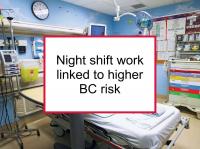A new study has reported that night shift work is associated with increased breast cancer risk and that the risk is worst for women working the most disruptive shifts. Night shift work is a widespread work-related cancer risk factors. Animal experiments have demonstrated that light exposure during normal night time hours promotes tumor growth.
Population studies have also reported that night shift work may increase breast cancer risk. However, previous studies have not usually taken shift-work patterns into account (for example, permanent compared to rotating shifts or evening hours compared to late night).
The study included a subset of a national database of Danish nurses. A total of 310 cases of primary breast cancer were identified among the nurses from the nationwide Danish Cancer Registry. Four cancer-free nurses were selected to act as controls for each breast cancer case. Interviews were performed to obtain detailed information concerning lifetime shift work and other breast cancer risk factors.
Among the study participants overall, nurses who worked rotating shifts after midnight were found to have 1.8 times the risk of breast cancer compared to nurses with permanent day shifts. No increase in breast cancer risk was found among the small group of nurses with evening work but no night shifts.
Nurses with periods of permanent night shift work in addition to periods of rotating night and day shifts experienced the highest breast cancer risk (2.9 times the risk of day shift only workers). When considering only those nurses who worked rotating shift systems, the highest risk was found for long-term day-night rotating shifts (2.6 times).
